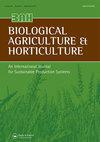Sustainable agroforestry systems and their structural components as livelihood options along elevation gradient in central Himalaya
IF 1.6
4区 农林科学
Q3 AGRONOMY
引用次数: 12
Abstract
Abstract Himalayan ecosystems are complex, with fragile environment, rugged terrain, unique topography and sensitive to regional and global changes. This region harbours a variety of agricultural practices out of which traditional agroforestry systems are of paramount importance with regard to sustainability and livelihood. In the central Himalayan region, four major traditional agroforestry systems were observed; agrisilviculture (AS), agrihorticulture (AH), agrihortisilviculture (AHS) and agrisilvihorticulture (ASH). System units in each system varied from 8 to 24 and they also differed along the elevation. Likewise, structural components varied in the systems as well as along the elevation. These systems have evolved over long periods of time as farmers have grown the trees and crop combinations for generations. These systems fulfill diverse needs for food, fodder, fruit and timber for the inhabitants of the mountains and provide a backbone to the hill economy and livelihood security for local people.喜马拉雅中部海拔梯度沿线的可持续农林系统及其结构组成部分作为生计选择
喜马拉雅山生态系统复杂,环境脆弱,地形崎岖,地形独特,对区域和全球变化敏感。该地区有各种农业实践,其中传统的农林系统对可持续性和生计至关重要。在喜马拉雅中部地区,观察到四个主要的传统农林业系统;农业栽培(AS)、农业园艺(AH)、农业栽培(AHS)和农业园艺(ASH)。每个系统中的系统单位从8到24不等,而且它们也随着海拔高度的不同而不同。同样,结构构件在系统中以及沿立面变化。随着农民世代种植树木和作物组合,这些系统经过了很长一段时间的发展。这些系统满足了山区居民对食物、饲料、水果和木材的各种需求,并为山区经济和当地人民的生计保障提供了支柱。
本文章由计算机程序翻译,如有差异,请以英文原文为准。
求助全文
约1分钟内获得全文
求助全文
来源期刊
CiteScore
3.30
自引率
6.70%
发文量
18
审稿时长
>36 weeks
期刊介绍:
Biological Agriculture & Horticulture aims to act as the central focus for a wide range of studies into alternative systems of husbandry, and particularly the biological or organic approach to food production. The Journal publishes work of a sound scientific or economic nature related to any aspect of biological husbandry in agriculture, horticulture and forestry in both temperate and tropical conditions, including energy and water utilization, and environmental impact.

 求助内容:
求助内容: 应助结果提醒方式:
应助结果提醒方式:


